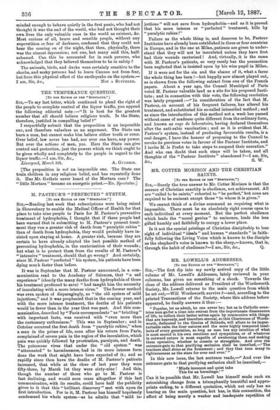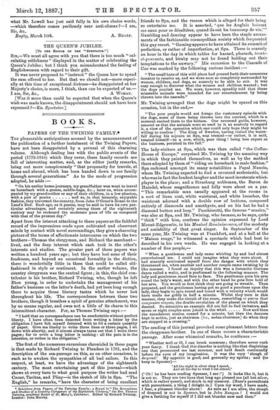MR. LOWELL'S ADDRESSES.
[TO TEE EDITOR OP THE SPECTATOE."J
Sts,—The first dip into my newly arrived copy of the little. volume of Mr. Lowell's Addresses, lately reviewed in your columns, has given use something of a shock. Towards the close of the address delivered as President of the Wordsworth Society, Mr. Lowell returns to the main question from which he set ont,—Will Wordsworth survive ?—and, according to the printed Transactions of the Society, where this address before appeared, he finally answers it thus ;—
" Popular, let us admit, he can never be but as in Catholic coun- tries men go for a time into retreat from the importunate dissonancea of life, to collect their better selves again by communion with things that are heavenly, and therefore eternal, so this Chartreuse of Words. worth, dedicated to the Genius of Solitude, will allure to its imper- turbable calm the finer natures and the more highly tempered intel- lects of every generation, so long as man has any intuition of what is most sacred in his own emotions and sympathies, or of whatever in outward nature is most capable of awakening them and making them operative, whether to console or strengthen. And over the entrance-gate to that purifying seclusion shall be inscribed,—' The teachers shall shine as the firmament and they that turn many to righteousness as the stars for ever and ever.' " In this new issue, the last sentence reads,—" And over the entrance-gate to that purifying seclusion shall be inscribed,— 'Minds innocent and quiet take This for an hermitage.' "
Can it be possible that Mr. Lowell has himself made such as astonishing change from a triumphantly beautiful and appro. priate ending, to a different quotation, which not only has no bearing on the main question, but has, in this connection, the effect of being merely a weaker and inadequate repetition of what Mr. Lowell has just said fully in his own choice words, —which therefore comes perilously near anti-climax ?—I am, Sir, Fa.,



































 Previous page
Previous page